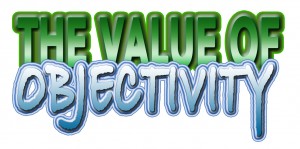
An anorexic girl looks in the mirror, sees a fat person and is determined to lose weight. Her self-view is distorted because she cannot look at herself objectively. Even though others may reassure her that she is too thin, in her distorted impression, she thinks she is obese.
To some degree, no matter how hard we all try, we cannot be objective with ourselves. This is true in every aspect of life including business. Many failed marketing attempts are the result of lack of objectivity. A marketer will tell me “I know my market and how to advertise to it.” This is only partially true. While business management has extensive knowledge and experience with their products and services, they cannot place themselves into the mindset of their buyers or potential customers. Unfortunately, many marketers do not understand this.
It is not important what you want to say in your ads… or, what you want to promote… it’s what does the customer want!
The primary source of information that a company receives is directly from their active customer base. In other words; buyer’s talk to the marketer and the marketer interprets their response. From this subjective interpretation the marketer draws conclusions on what it takes to sell to their market. It is impossible for a marketer, or their staff to solicit, obtain and compile objective marketing data, because they are tainted by limits and their own interpretation.
Let me illustrate this with an analogy. Let’s say you get a new haircut. You ask a few friends, “How do you like my new hair style?” Most folks will be complimentary, because they like you and don’t want to hurt your feelings. Even if it looks bad, you’ll get a modest response like, “It’s OK.” From these responses you will conclude that “everybody” likes your new hairstyle.
Now, let’s approach this from an objective standpoint. Let’s say I (an independent third party) confidentially ask a group of people (not your friends), “What they think of your hairstyle?” I will get completely objective responses from a cross-section of people, which will be more accurate. This objectivity may be important to you in making future decisions on how you will wear your hair in the future.
In business, if you rely only on your customer’s response, your conclusion will be skewed. These are people that like you, and are doing business with you. How about people who have chosen not to buy from you? How about your competitor’s customers? What about potential customers? In order to reach an objective conclusion, you must consider, not just the existing market, but the potential market as well. Hundreds of millions of dollars are spent on marketing research every year to determine how to market products and services. All of these studies are conducted by outside services that present their totally objective findings.
An objectivity killer, and a thorn in the side of any marketing professional, is the ‘know-it-all’ at the client level. Sometimes it’s the boss himself, but often it is a self-professed ‘expert’ that has all the answers. They claim to know what the customer wants and how to market it. Sometimes they design their own advertising. One such individual was an engineer named Bill, who worked for a company that produced Telex/TWX Machines, back in the days before computers. Bill sat in a marketing meeting and announced, “We don’t need to be so creative. All we should do is list our spec’s in the ad!” Bill assumed, that every potential customer understood spec’s and would be motivated by this technical approach. Bill was not objective!
Another client in the automotive parts business introduced me to Bob, a counter salesman who, because he talks to customers, knows all there is to know about selling their products. Bob never had any formal education or work experience in marketing, but that didn’t stop him from suggesting how to do ads. All Bob’s ideas were limited to his personal opinions. Bob was not objective!
One of the biggest mistake’s advertisers make is they assume their market knows more than they do. A good marketing program communicates with the lowest level of the potential market without insulting the intelligence of the most sophisticated buyer.
As a seasoned marketing consultant, I endeavor to develop marketing strategies and campaign elements based on an outside objective assessment of each client’s factors. I listen to the Bills and Bob’s but I also ask questions, Why someone would want to buy your product or service? What is the biggest obstacle to making a sale? What is the most asked question your buyers have? From the answers, I am able to objectively recommend concepts based on experience and creative talent.
As a seasoned marketing consultant, I endeavor to develop marketing strategies and campaign elements based on an outside objective assessment of each clients factors. An objective Marketing Analysis will identify the factors and opportunities to capitalize on in your marketing campaign. Tom Smisek Marketing Consultants Orange County California.
